Commentary weighs strength of Moscow-Tehran-Baku alliance
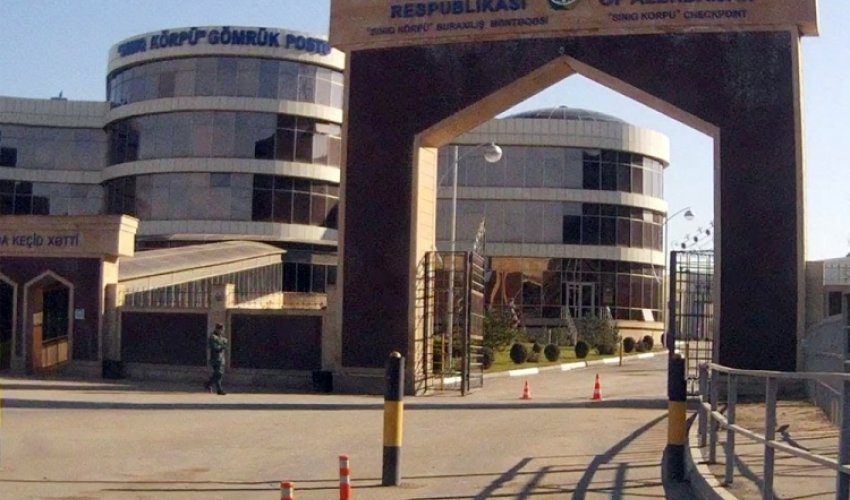
by Sergey Markedonov
As a result of the talks a declaration was adopted in which the sides expressed a commitment to the "comprehensive development of equitable and mutually beneficial cooperation" and also stated a readiness "to deepen and broaden the political dialogue at various levels" on topics representing "mutual interest" to Baku, Tehran, and Moscow.
Thus all the appropriate protocol-related words were uttered. The high parties demonstrated a readiness for all-around cooperation. But does this signify the formation of a regional influence group in Eurasia capable of bringing pressure to bear on the socioeconomic processes and security in the Caucasus-Caspian region and the Middle East? Is it possible to say that Russia is ready to adjust its priorities in regard to the Nagorno-Karabakh settlement? Since the Aprilescalation there has been plenty of speculation in Armenia, Azerbaijan, and Russia itself on the theme of the "acceleration" of the peace process under Russia's auspices.
For answers to the questions posed above it is best to begin with a definition of the common points and varying interpretations in the foreign policy approaches of Russia, Azerbaijan, and Iran. On the one hand, all three countries can hardly be called allies. Azerbaijan is involved in many infrastructure and energy projects which are viewed as an alternative to the Russian Federation's "energy domination." According to Jeffrey Mankoff, a well-known expert of the Washington Centre for Strategic and International Studies, "depending on the development of the world's energy markets in the next decade or so, the significance of supplies of Caspian energy resources could decline for Europe. But the United States will nonetheless support the pipelines across the South Caucasus as a means of ensuring geopolitical pluralism." Which should be read as meaning competition for Russian energy projects. Baku, too, is not showing a special interest in entering the Eurasian Economic Union EAEU (however, considerations of "national egoism" also determine Azerbaijan's approach to cooperation with the EU, which is built on the principle of selective advantage). But its membership of the Collective Security Treaty Organization CSTO along with Armenia in conditions of the unresolved Nagorno-Karabakh conflict would simply be nonsense. Primarily from the viewpoint of the effectiveness of the solution of the problem which is a priority for Baku.
Nor should such an acute subject as "territorial integrity" be forgotten. Hence, too, Azerbaijan's extreme caution on the "Crimean question" and also on Abkhazia and South Ossetia and the extreme interest in the development of bilateral relations with Ukraine and Georgia. Both countries are regarded by official Baku as priority partners.Of course the Azerbaijani authorities take a distrustful view of Russian-Armenian relations which are seen as an obstacle to the unravelling of the Karabakh
knot on advantageous terms for the Caspian republic.
Russian-Iranian relations have their complexities too. First, declarations about a commonality of views and a rejection of US global hegemonism are not backed up by a solid economic foundation. What we see is a divergence between the desired and the real. Second, officialTehran unlike Russia is an opponent of the share-out of the Caspian, insisting on equal rights to its waters. And if we are talking about conflicts in the Transcaucasus and Ukraine, the well-known Tehran expert Kayhan Barzegar used the successful metaphor of "active neutrality" in regard to them. Translating this from diplomatic speak to ordinary language, what this means is a readiness to use the contradictions between Russia and the West in its own interests.
At the presenttime the acuteness of the Azerbaijani-Iranian contradictions is not so noticeable. President Ilham Aliyev and President Hassan
Ruhani personally have played a significant role in the improvement of the neighbouring states' bilateral relations. Nevertheless, such questions as the spread of Iran's religious influence in Azerbaijan and Baku's close ties with the West and NATO (even if oriented primarily towards Turkey) create definite problems. Tehran, despite the support for the neighbouring country's territorial integrity (incidentally the Islamic Republic has also refused to recognize the independence of Abkhazia and South Ossetia), consistently opposes a military solution of the Nagorno-Karabakh conflict. This does not unduly inspire Baku either where the opportunities for revanche on certain conditions remain open. As in the case of Russia, Azerbaijan looks warily at Iranian- Armenian cooperation and a readiness to deepen it in the mutual interests of Yerevan and Tehran.
Consequently it is hardly possible to consider Iran, Russia, and Azerbaijan allies. And no matter how productive the talks in Baku were and no matter how promising the summit's final declaration was, the alliance character of relations or the formation of some kind of "axis" in the near future do not appear possible. However, all three countries have their common menu. Tehran, Moscow, and Baku take an extremely sceptical view of the practices of outside forces' interference in the internal affairs of countries that are experiencingethno-religious problems and con
flicts. And in this context one can sense that the three countries have a common interest in the resolution of the Syrian crisis. The model "Al-Asad must go" is sometimes perceived too literally by the three states' elites as a pattern applicable to themselves. All three countries are united by a rejection of Islamic State, which is banned in the Russian Federation, and of jihadist groupings aimed at the destabilization of the Caucasus, Central Asia, and the Middle East.
Iran, Azerbaijan, and Russia (each for different motives and reasons, however) would be interested in a measured "Westernization" of the Transcaucasus. Baku is interested in joint energy projects withUS and European companies but didacticism in the matter of the protection of human rights and domestic political
standards in general is not acceptable. Tehran regards the West's peacemaking in Nagorno-Karabakh as an attempt to "encircle" Iran, hence both the rejection of "renewed Madrid principles" and statements on the need for an alternative solution
of the conflict using exclusively regional actors. But Russia perceives the post-Soviet space as the sphere of its special interests and regards the West's policy as a "zero-sum game," that is, a targeted move to oust it from regions of special strategic importance. But surely the main thing is the striving of Iran, the Russian Federation, and Azerbaijan for a reduction of regional and international turbulence. In the choice between democratization and
stabilization the three states prefer the latter as a model with the fewest possible risks.
How important were the questions of ensuring regional security for the Baku summit? If you try to find some revolutionary breakthroughs in the trilateral forum's results, its results should not be exaggerated. But, if you do not set yourself maximalist targets and if you assess the event not in the context of overstated expectations but in accordance with the formula of politics as "the art of the possible," then special attention should be drawn towards several important theses. And, first and foremost, to the assessments of the prospects for the Nagorno-Karabakh settlement voiced by Russian Federation President Vladimir Putin. Without entering into a polemic with anyone the Russian leader effectively disavowed the speculation and rumours about the so-called "Lavrov plan" which have been circulating for more than a year now even if under various other names. In essence they are that Moscow is ready to push through a plan for an accelerated settlement of the conflict for the sake of the deployment of peacekeepers in Karabakh and the affiliation of Azerbaijan to the EAEU. Meanwhile, in reality Moscow has never set itself the goal of a mechanical enlargement of the integration structure. Quite the contrary, when planning the Eurasian project the Kremlin saw it not as a second Commonwealth of Independent States or as a club of former republics of the USSR but as a working association. Only "geopolitical theorists" far removed from an understanding of the complexities and contradictions of the concrete peace process can believe that a forced-pace settlement of the Karabakh conflict will miraculously pacify Armenia and the unrecognized Nagorno-Karabakh Republic and lead to harmony in the Transcaucasus.
In Baku on8 August Putin made a statement on the kind of solution to the Karabakh conflict that, first, will be a "compromise" and, second, will be "acceptable to both sides" which would enable them to feel that they are winners. Will the forced-pace implementation of some kind of "Lavrov plan" help this? It is a rhetorical question. Most probably it could be a question of a complex coordination and an ensuring of the decisive role of Russia (at least comparable with the role of the other countries that are co-chairmen of the Minsk OSCE Group) in the attainment of a definitive compromise. An extremely clear message was sent to the parties to the conflict: Moscow will not be transformed into either Azerbaijanis or Armenians and will work not in an abstract way but for its own interest which consists in the prevention of a large-scale war fraught not only with a great many casualties and the movement of instability closer to Russia's state borders but also with interference by third parties. Meanwhile, there is nothing especially new in this approach. But after the escalation in April it has been formulated in the most concentrated form.
President HasanRuhani [Rouhani] also spoke in
similar vein: "Any problem must find its solution by peaceful means. Iran has always supported Azerbaijan's territorial integrity and advocated the peaceful settlement of the question. If we have the possibility of the settlement of the conflict in our hands we will not refuse it." Probably Azerbaijani politicians and experts above all took note of the thesis on the maintenance of "the country's territorial integrity." From our viewpoint, however, the Iranian president's key theses were the words about a peaceful settlement and a readiness for mediation in this process. I think that in certain circumstances Moscow too could appeal to Tehran's opinion. Particularly in regard to meticulousness in the elaboration of the final models of the peace settlement.
But as for President Ilham Aliyev, the main point in his words was the recognition of Russia's constructive role in the negotiating process and also the positive assessment of the trilateral format (Russian Federation -- Azerbaijan -- Armenia), which gives Moscow a certain credit of trust. I believe that a similar credit will also be given to Russia during the talks between Vladimir Putin and Serzh Sargsyan planned for 10 August.
Thus the Baku summit showed that in regions such as the Transcaucasus what is coming to the forefront today is not all-embracing coalitions and blocs but a case-by-case, selective collaboration. It will involve not only the participants in the meeting in the Azerbaijani capital but also Turkey and the West (for example, in the process of the Karabakh settlement) and other countries of the region. It is not ruled out that it will also rise above existing divergences (such as the Russian Federation and Georgia). And if such pragmatic collaboration enters into practice, regional security will be more stable than today even if it is not accomplished "finally and de facto."
www.ann.az
A trilateral summit of the presidents of Russia, Azerbaijan, and Iran was held in Baku 8 August 2016. During the meeting of the three states'
leaders a broad range of problems was examined, beginning with energy security through to the settlement of
ethno-political conflicts and the combating of terrorism.
As a result of the talks a declaration was adopted in which the sides expressed a commitment to the "comprehensive development of equitable and mutually beneficial cooperation" and also stated a readiness "to deepen and broaden the political dialogue at various levels" on topics representing "mutual interest" to Baku, Tehran, and Moscow.
Thus all the appropriate protocol-related words were uttered. The high parties demonstrated a readiness for all-around cooperation. But does this signify the formation of a regional influence group in Eurasia capable of bringing pressure to bear on the socioeconomic processes and security in the Caucasus-Caspian region and the Middle East? Is it possible to say that Russia is ready to adjust its priorities in regard to the Nagorno-Karabakh settlement? Since the April
For answers to the questions posed above it is best to begin with a definition of the common points and varying interpretations in the foreign policy approaches of Russia, Azerbaijan, and Iran. On the one hand, all three countries can hardly be called allies. Azerbaijan is involved in many infrastructure and energy projects which are viewed as an alternative to the Russian Federation's "energy domination." According to Jeffrey Mankoff, a well-known expert of the Washington Centre for Strategic and International Studies, "depending on the development of the world's energy markets in the next decade or so, the significance of supplies of Caspian energy resources could decline for Europe. But the United States will nonetheless support the pipelines across the South Caucasus as a means of ensuring geopolitical pluralism." Which should be read as meaning competition for Russian energy projects. Baku, too, is not showing a special interest in entering the Eurasian Economic Union EAEU (however, considerations of "national egoism" also determine Azerbaijan's approach to cooperation with the EU, which is built on the principle of selective advantage). But its membership of the Collective Security Treaty Organization CSTO along with Armenia in conditions of the unresolved Nagorno-Karabakh conflict would simply be nonsense. Primarily from the viewpoint of the effectiveness of the solution of the problem which is a priority for Baku.
Nor should such an acute subject as "territorial integrity" be forgotten. Hence, too, Azerbaijan's extreme caution on the "Crimean question" and also on Abkhazia and South Ossetia and the extreme interest in the development of bilateral relations with Ukraine and Georgia. Both countries are regarded by official Baku as priority partners.
Russian-Iranian relations have their complexities too. First, declarations about a commonality of views and a rejection of US global hegemonism are not backed up by a solid economic foundation. What we see is a divergence between the desired and the real. Second, official
At the present
Consequently it is hardly possible to consider Iran, Russia, and Azerbaijan allies. And no matter how productive the talks in Baku were and no matter how promising the summit's final declaration was, the alliance character of relations or the formation of some kind of "axis" in the near future do not appear possible. However, all three countries have their common menu. Tehran, Moscow, and Baku take an extremely sceptical view of the practices of outside forces' interference in the internal affairs of countries that are experiencing
Iran, Azerbaijan, and Russia (each for different motives and reasons, however) would be interested in a measured "Westernization" of the Transcaucasus. Baku is interested in joint energy projects with
How important were the questions of ensuring regional security for the Baku summit? If you try to find some revolutionary breakthroughs in the trilateral forum's results, its results should not be exaggerated. But, if you do not set yourself maximalist targets and if you assess the event not in the context of overstated expectations but in accordance with the formula of politics as "the art of the possible," then special attention should be drawn towards several important theses. And, first and foremost, to the assessments of the prospects for the Nagorno-Karabakh settlement voiced by Russian Federation President Vladimir Putin. Without entering into a polemic with anyone the Russian leader effectively disavowed the speculation and rumours about the so-called "Lavrov plan" which have been circulating for more than a year now even if under various other names. In essence they are that Moscow is ready to push through a plan for an accelerated settlement of the conflict for the sake of the deployment of peacekeepers in Karabakh and the affiliation of Azerbaijan to the EAEU. Meanwhile, in reality Moscow has never set itself the goal of a mechanical enlargement of the integration structure. Quite the contrary, when planning the Eurasian project the Kremlin saw it not as a second Commonwealth of Independent States or as a club of former republics of the USSR but as a working association. Only "geopolitical theorists" far removed from an understanding of the complexities and contradictions of the concrete peace process can believe that a forced-pace settlement of the Karabakh conflict will miraculously pacify Armenia and the unrecognized Nagorno-Karabakh Republic and lead to harmony in the Transcaucasus.
In Baku on
President Hasan
But as for President Ilham Aliyev, the main point in his words was the recognition of Russia's constructive role in the negotiating process and also the positive assessment of the trilateral format (Russian Federation -- Azerbaijan -- Armenia), which gives Moscow a certain credit of trust. I believe that a similar credit will also be given to Russia during the talks between Vladimir Putin and Serzh Sargsyan planned for 10 August.
Thus the Baku summit showed that in regions such as the Transcaucasus what is coming to the forefront today is not all-embracing coalitions and blocs but a case-by-case, selective collaboration. It will involve not only the participants in the meeting in the Azerbaijani capital but also Turkey and the West (for example, in the process of the Karabakh settlement) and other countries of the region. It is not ruled out that it will also rise above existing divergences (such as the Russian Federation and Georgia). And if such pragmatic collaboration enters into practice, regional security will be more stable than today even if it is not accomplished "finally and de facto."
www.ann.az
Similar news
Similar news

























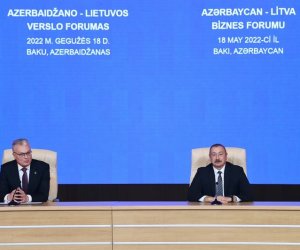
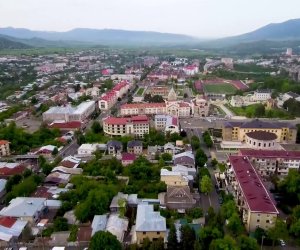

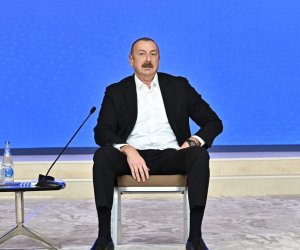

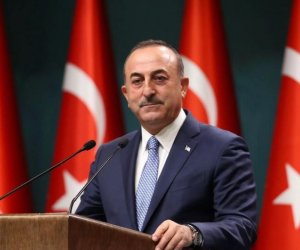





 Photo
Photo 



 Video
Video 

